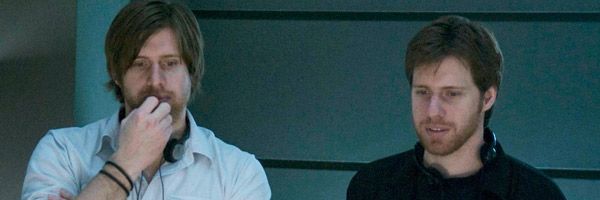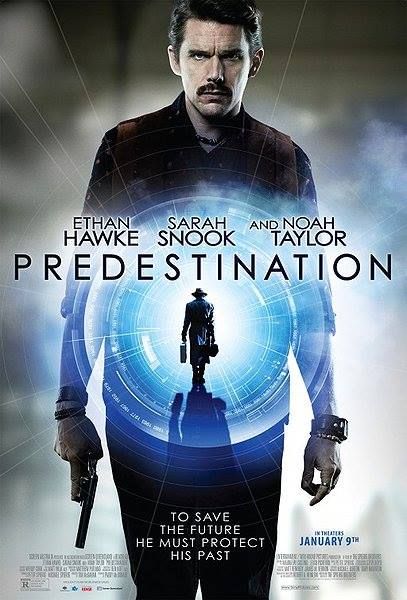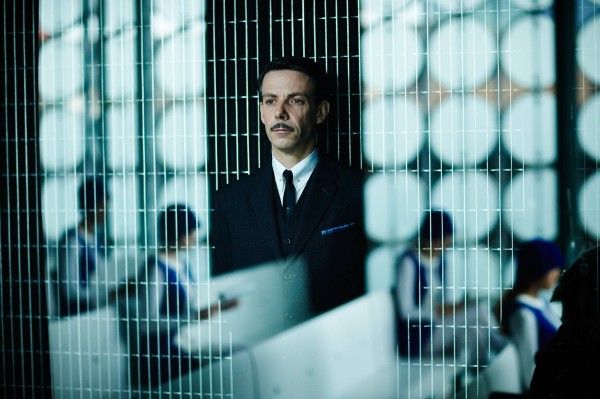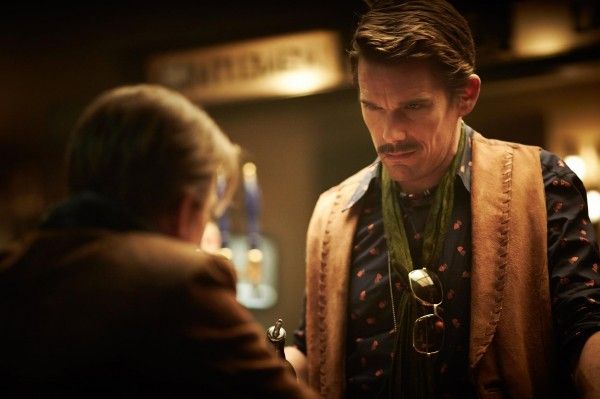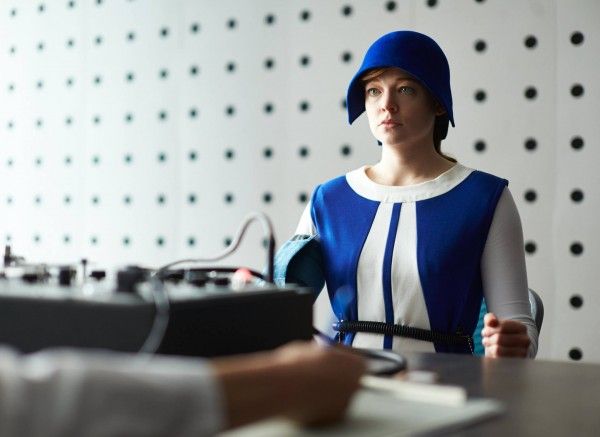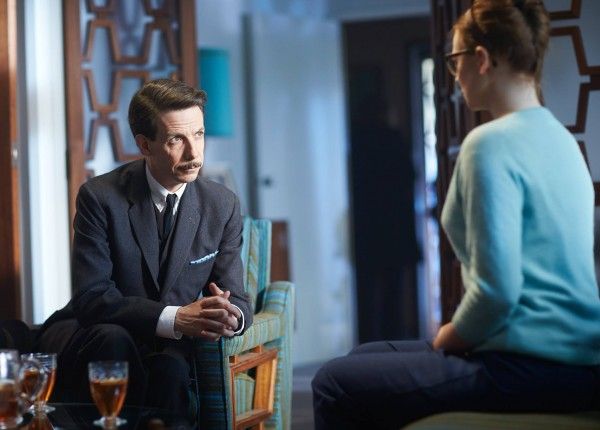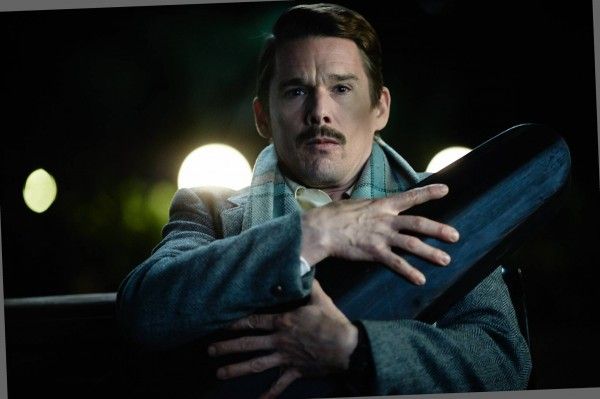A man walks into a bar. Such a standard setup but in author Robert E. Heinlein’s six-page story All You Zombies, it leads to a satirical denouement on the impracticality of time travel and the horrors of pre-determinism. The brilliance of the Spierig Brothers film-adaptation Predestination lies in its ability to turn a six-page joke into a modern-day (or past-day) tragedy. The setup is still the same. A man walks into a bar – where neither the man (rising-star Sarah Snook) nor the bartender (Ethan Hawke) is whom they initially appear to be. It’s a film predicated on twists and a late third-act reveal that may be better off knowing going in. One can get lost attempting to outsmart the film instead of paying attention to the nuances therein.
This is a long preamble to say that there are spoilers in the following interview with filmmakers Michael & Peter Spierig (Undead, Daybreakers) that in no way diminish the experience of actually watching the film. In fact, I would encourage anybody with interest to read Heinlein’s short story beforehand to render the whole thing moot. Regardless – in the following interview with the Spierig brothers, the duo discuss their adaptation process, storyboarding and the tragic undercurrents of Predestination. For the full interview, hit the jump.
Question: How did you come about picking Heinlein’s short story All You Zombies? What was the appeal of adapting it to a feature?
Peter Spierig: I read it first. I can't remember when. It was quite a few years ago. It just stuck with me and I gave it to Michael and said you must read this.
Michael Spierig: We had both read Heinlein before; but this one in particular -- there was just something that stuck with us. We had to make this into a film.
What is that process like when you're adapting a short story? How do you fill it in?
Michael Spierig: With this short story, we literally took the format and put it into a screenplay. That ended up being thirty pages. Then we focused on the things we really wanted to expand upon. We talked about adding a thriller element, explaining a little bit but not too much about the time travel agency and we picked this one line that's in the short story -- that ‘Fizzle [War] bit. We took that and we expanded the bomber character.
How do you settle on that bomber/thriller storyline as the backbone for the picture?
Peter Spierig: There has to be something that's driving the story forward from a thriller perspective. There has to be some sort of threat going on. We talked a lot about doing it in a way that felt organic and felt like it lived in that world. The Heinlein short story doesn't have that at all. But it has to be a movie. If you just adapted the story and that was it -- it's a nice set-up and pay-off but it's certainly not a theatrical film story.
Michael Spierig: Heinlein’s story is a big joke about why time travel isn't possible. We get that. In his story, he was really quite cynical about certain things. What we called Space Corps, he called W.E.N.C.H.E.S. As we were writing the script, we started with W.E.N.C.H.E.S and we were like [can] we really do this? It's just going to be too preposterous. We tried to stay true to [Heinlein’s] ideas but we took a little bit of that satirical element out.
Peter Spierig: It was such a different time. It was 1958 when he wrote the story. What we tried to do -- was show our version of what Heinlein thought was going to be the future. We wanted to stay true to that. Because the 1970s and 60s that exists in our film doesn't exist in our reality.
That's one of my favorite things about the movie: that it’s a period time travel movie. Even the future is 1991 or so.
Michael Spierig: It's a projection of what Heinlein thought the future was going to be when he wrote the story.
Peter Spierig: That for us was more interesting than making it what we know today. Like the idea of Space Corp -- the idea of NASA basically recruiting girls to accompany men into space to be escorts for astronauts. I'm pretty sure that didn't happen in NASA but it's an interesting idea and we wanted to keep all that.
How do you both split up the writing duties on a screenplay?
Peter Spierig: It's a little different every time. But we normally plot the whole thing out on a board in detail. Then we say I know this bit, you know that bit -- let's just write. Sometimes [one of us] will say ‘Let me have the first crack at it’ and then maybe he writes the first draft and then I come in and rewrite it. It just depends. But usually we just lay it all out on a board and we pick scenes and then we'll come together at the end of the week and see what we got.
Are you storyboarding as you're writing?
Peter Spierig: Sometimes
Michael Spierig: We'll talk about ideas. I do animatic and all that stuff so I might do a little sequence in the computer and cut it together and all that stuff.
Peter Spierig: We've learned lessons about story boarding. We used to -- and we still sort of do this -- but we used to storyboard every single thing. Our first two movies, we've still got the books and they're like telephone books of storyboards. We storyboarded every single frame of the film. On this film, we storyboarded the necessary bits - the time traveling and the action sequences but we were a lot looser. I think it's better to be that way when you're doing a lot of drama. You don't want to be so rigid to say you must walk there and do that. This film was a freer experience than our last couple films just because it was more like a play. But we're big believers in pre-production and prepping everything. We'll test everything. We spent so much time testing the makeup for this film. So much testing and it's so essential. We test everything -- hair, fabrics, the stubble on Sarah's [Snook’s] face...
How did you decide on the final look for Sarah?
Michael Spierig: Well -- that was probably the biggest decision we made on this film. We talked about the idea of having two actors play the role: the male and the female character in the film. That's the easy way to do it. That's the safe way. But we always said the really interesting thing to do would be to cast one actor to do it. Thankfully Sarah Snook came into our lives.
Peter Spierig: It was never our intention to make her look completely like a masculine man though. The intention was and the people who go through this operation, this change -- they don't look completely masculine. There's still a feminine side and so we settled on a makeup that we thought was a nice balance between those two. But it was a long process. She was in the make-up chair for four hours every morning and for weeks and weeks and weeks. And we did scenes with her and the other version of her...
How do you go about shooting those scenes with Sarah? Which version of her do you shoot first?
Michael Spierig: The best way to do stuff like that is to cast doubles. Not just doubles -- actors. So she's got something to work off of and you allow them time to rehearse.
Peter Spierig: The hard thing too with shooting one side of Sarah and then the other side is there's a four-hour gap. For Sarah to remember everything she did is [very difficult]. Our job was to remind her of all the things she was doing. It's tricky but a hell of a lot of fun and when it works and you cut it together it seems like it's all happening right there.
Michael Spierig: It's all low-tech too. There are no major complex visual effects. It's all old school tricks like split screens and doubles and moving things around. There's this assumption that science fiction is space ships and robots and we really wanted to go back to old school sci-fi where it's about concept and ideas that make people think about their lives, fate and chance and all those sorts of things.
Thematically the movie's interesting in that usually when people talk about destiny, it's usually in some sort of positive context but here in this film – it’s very much a negative. I'm interested where do you stand on the destiny versus free will spectrum?
Peter Spierig: The film deals with it in a way. The film's called Predestination so that gives you some idea of what's going on there; but are the events in the film always going to occur that way? Are they meant to occur that way? That's up to the audience to decide. But having said that, I personally think even if we had choice, how could you ever know?
Michael Spierig: It's that weird thought of ‘Well -- I'm in control of my life’ and then you look back on it and you're like ‘Well -- that turned out the way I thought it would’. So do we have control -- I like to think so. I like to think that we're in charge of our own destiny. But I don't know.
Peter Spierig: Anybody who says they know is lying. Anyone who can tell you for sure there is a God or that there isn't -- how can you know?
That's interesting -- Because when I watched this movie I thought it was a very negative stance on pre-determinism. The movie’s basically a Greek tragedy.
Peter Spierig: It's definitely a tragedy. We always thought of it as a really tragic love story. That was our intention from the beginning. But you also have to look at the person's life in this film as a person who has accomplished great things at a great cost. We talk about purpose in the film quite a bit. What is the purpose of someone's life? It may end up being heartbreaking and tragic; but on the way you do wonderful and extraordinary things at the sacrifice of sanity or love or whatever it is…
I've seen the movie twice now actually -- and I actually think it works better the second time, knowing where it’s going. Because then it becomes so sad...
Michael Spierig: That's what we think too. I think the second time around... Oh god I don't know what to say because I'd just give so much away but I think the second viewing is better simply because some things are obvious -- well they should be obvious.
I think so.
Michael Spierig: Well they should be. We blatantly say some things in there and if you're paying attention, you should get it but I think the second time around you really see the tragedy of it all. And you see the cynicism of the bartender character as well. So I think the second viewing is so much more interesting knowing the outcome.
You guys have now done zombie, vampire and time travel genre films. What are you guys working on next or what genre are you thinking of exploring?
Michael Spierig: We have a movie -- it's been announced but we're working on it right now. It's called Winchester and it's about the Winchester mystery house in San Jose. I'm not sure if you're familiar with it.
Not very...
Michael Spierig: It's a tourist attraction now but Sarah Winchester was the heir to the Winchester rifle fortune so she had a tremendous amount of wealth. She built this house in San Jose - this mansion with I-don't-know how many rooms… over three-hundred. At one point, I think it was five hundred. She believed she was being haunted by all the people who had been killed by the Winchester rifle so she built this house to confuse the ghosts. It's all based on truth, if you believe. That's such a fascinating story and she's such a fascinating character so we're writing a screenplay at the moment and it's a very creepy, very scary haunted house movie.
Predestination opens in select theaters this Friday.

